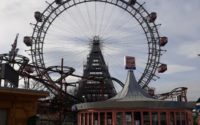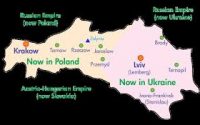Paying Respects
09.09.2017
Continuing with my diary extracts.
From today, my Interrail card is valid and I’ll be using it to travel between all my planned destinations in Poland and Germany. The train from Berlin to Warsaw is an ideal route to take as it stops in Poznań, one of Poland’s major cities from where you can get connections to the other major cities of Wrocław, Gdańsk and Kraków. I’m heading to a town called Piła, about an hour or so from Poznań, in a north westerly direction. Using Piła as my base for a few days, I will spend a day in Wałcz, visiting my grandfather’s grave.
As I wrote previously, I have been on this line before. This time there are no border guards lining up to check passports, and you have to look out for the bridge over the border at the River Oder to know you have crossed into Poland before passing through the first rail station, Rzepin on the Polish side. In case you are in any doubt you’re in Poland the ‘z’s in most of the names are the giveaway! The compartment I’m seated in has three Germans, two Americans and myself. I’m delighted at this arrangement, because the rest of this wagon is full of pensioners, south of England tourists on an organised trip. God, how loud and ignorant they are! No attempt to speak anything other than loud English and at the same volume, insulting of the Polish language when the catering staff offered refreshments. How different our compartment is, where we all ordered in our basic Polish, to the delight of the staff.
Unfortunately, there is only a two hour layover in Poznań, the fifth largest city in Poland. It has undergone major renovations in recent years and has been recommended by some of my acquaintances.
On the connecting train to Piła, I’m in deepest Poland now, unlike the fashionable destinations of Krakow, Warsaw, Gdańsk or Wrocław which are on my itinerary. For now I’ll get to see the country as it truly is, away from tourists. Before WW2 the town was part of Germany and was known as Schneidemühl. How does that come anywhere near the Polish name Piła? The German name means sawmill and the Polish sawcut. In this way both denote the industry that originally sustained the town. My own grandfather worked, so I understand, for the forestry commission here after WW2 in the small town of Wałcz which lies some 25 km north east of Piła, which is the reason I’m here. As I write this, it dawns on me that, when I visit his grave this Monday, it will be ten days off the 60th anniversary of his death. I wonder if any of his family (not immediate) knew he ended up here? My own father certainly never did despite his repeated attempts and stonewalling by the Polish authorities of the day. If not, does this mean I will be the only family member ever to pay my respects? I’d also like to know why he was assigned to this area. Perhaps the Wałcz Museum director, Beata, will enlighten me. It’s another incident in history of which people like me are ignorant. It would be an added bonus if there was some written accounts of what was here in the aftermath of WW2 when Poland had a rigid Stalinist regime.
Before this though I’m going to sample lots of what the Poles excel at better than most others – cuisine – and I’ve twenty days of it ahead of me.
10.09.2017
Sunday morning in provincial Poland is probably a good time to be a burglar, unless of course the police all attend evening Mass.
You would need a reason to have to come to Piła, it really has little in the way of redeeming features as far as I can see. I can imagine the only way to escape the monotony of the place during the Communist era was through the solace of vodka. No wonder so many Poles left places like this when access to other EU countries became an option. The few streets and buildings that are in anyway eye-catching are German style. The German population was expelled from here when it became part of the territory annexed to Poland in 1945 and yet German is widely understood. Proof that no one can ever completely erase the past. I’m pleased that this is near the beginning of my travels because having this nearer the end would be an anticlimax. Curiously, there is a street named after Stalingrad; I would have thought they might have taken away any references to the Soviet era, especially now with the government that’s in power in Poland.
In any case, the day has not been wasted as the Director of the Museum in Wałcz, Beata Stankiewicz, has made arrangements for me to go there tomorrow to visit my grandfather’s grave and also to pass on documentation to me. Having found the bus station and the correct bus stance and having seen the condition of the buses, it should be an experience.
11.09.2017
Anything could happen today. I found the bus stance yesterday without any problem and again today. The bus I saw yesterday was not on the run today, and for 8 złoty (about £2) for a distance of over 20 km is not bad. I wondered why it took nearly an hour to cover this distance. Did for instance the bus run on four flat tyres? It happens that it goes off the main road and just about drops the passengers off at the front door.
At Wałcz, I notice the name of the street, Pocztawa, where the Museum is situated and ask the driver to stop, which he does. I had intended to continue to the bus station as the directions had indicated but off I got. It was less than a two minute walk to the Museum and I correctly guessed that the woman waiting outside was Beata. We had to converse in German, Beata being more fluent than me, as I have much less opportunity to use it, but I should say now that as the day progressed, I grew more relaxed.
I’m pleasantly surprised by Wałcz. It’s far better than I imagined it to be. The population is around 28,000 and it is the local administrative centre. You can see the German influences, indeed for most of its history it was largely German speaking.

Beata and her son take me to the Stary Cmentarz (Old Cemetery) where my grandfather is buried. She was here to find it when I first made contact about four years ago, and although we have the plot number she cannot remember where it is. We split up to search, and at first I’m reminded of the final scene from the Clint Eastwood film ‘The Good, the Bad and the Ugly’ when Eli Wallach runs round the graveyard in circles above each tiered line looking for a marker with the name Arch Stanton inscribed. Unlike the film, we find it, and, I’m surprised to find quite a decent headstone. His army rank is inscribed, and I think from what Beata said, it was the Polish version of the British Legion that put up the funds for it. To leave a token, I decide to buy flowers, red and white ones appropriately, with all the living family’s names written on a decorative ribbon. I think my father would have been pleased.
My grandfather worked for the forestry commission and I had always imagined as a woodcutter, but another pleasant surprise when we arrive at his old offices – he worked as an accountant! Finally we visit the house where my grandfather resided at 3rd May Street. The significance of the date being that it is Constitution Day and is a national holiday.


I now have my grandfather’s death certificate, which I obtain without any fuss from the local council. The administrator is intrigued to know why, and when I tell her and Beata the story, including Henryk Sucharski, they are animated. I have copies of the letters and other documentation about my grandfather’s military past which Beata scans and it in turn leads her to call the Westerplatte Museum in Gdańsk, where I speak to one of the staff. Not only is he elated when I explain the friendship between Sucharski and my grandfather but when I tell him about the role my grandfather played at the Battle of Kock under General Kleeberg. The letter Henryk Sucharski wrote to my father may be the last personal letter in existence. For these reasons, the Museum would like to meet me and to agree to a recorded interview. It seems that Poland craves this sort of information as it was all lost or suppressed in the past bt the Communist government. So Wednesday is the day.
Finally I buy the flowers and lay them on the grave and pay my respects from everyone. I think my dad would have been satisfied to learn that his father was well thought of and quite comfortable as far as I can assess.

One final point – I think I rate the chances of finding my father’s birth certificate as less than slim. In the lands the Germans occupied they kept all the records, so that anyone like me whose family was under German occupation would have a good chance at retrieving documentation. My family was under Russian occupation, and it seems that they destroyed everything that was not considered loot. The Polish people seem in general agreement, that the Red Army soldiers were far worse than the German soldiers in their behaviour – rape, pillage and wanton destruction, and the Poles were supposed to be allies. Bad enough as was the behaviour of the Red Army in Poland, it was just practice for the real thing when they crossed into Germany.
What dreadful thing war is; armies simply surrender, civilians are the ones punished because they are defenceless. Do I feel emotional about today’s events? Yes, but I also realise you can whip yourself subconsciously into a state. You lose the real meaning of emotions and instead it becomes selfish. I never knew my grandfather, but all the time I thought of my own father. To gush would be disrespectful I think, and both my father and grandfather deserved better, which I think I fulfilled.
End


